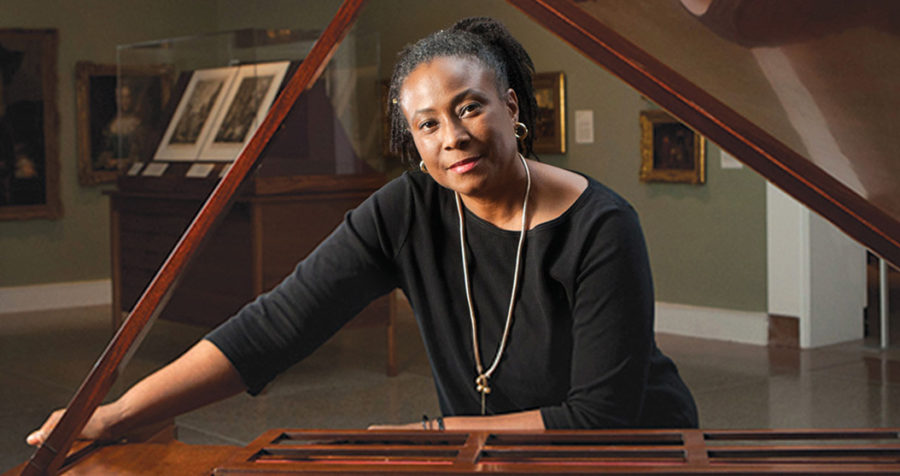Geri Allen, who made a profound impact on both the jazz genre and her students at Pitt, died of cancer on June 27 in Philadelphia. She was 60.
Born and raised in Detroit, Allen studied at Howard University before going on to earn her Master’s degree in ethnomusicology at Pitt in 1982. Allen spent the next 30 years making jazz records and touring the world. Her work as a pianist paired her alongside some of the most famous jazz musicians of the last three decades — including bassist Esperanza Spalding and saxophonist Ornette Coleman — and earned her various accolades such as the Guggenheim Fellowship in 2008 and the Danish Jazzpar prize.
Later in her career, Allen returned to Pitt as an educator, becoming director of jazz studies at Pitt in 2013.
Allen released over 20 albums as a bandleader, in addition to collaborating with countless other influential jazz artists.
Aaron Johnson, an assistant professor in the music department knew Allen throughout that entire career. He detailed Allen’s influence on the genre — both musically and in dealing with gender issues.
“As a musician, she was amazingly influential,” said Johnson. “First dealing with all the issues with women in jazz, which she did with grace and dignity, but more importantly fusing the whole history of jazz piano styles into her very modern playing.”
Throughout her career, Allen worked to further the careers of other women in jazz through tributes in her performances and directing an all-female jazz residency program at the New Jersey Performing Arts Center.
Johnson attributed Allen’s unique playing style to the influences of other great jazz artists such as Thelonious Monk and Andrew Hill and lesser remembered pianists such as Elmo Hope. But he made sure to note that she still maintained her own individual sound.
“In fusing those styles, she created her own voice, both in her remarkable playing, [and] in her amazing compositions,” Johnson said.
But for all of her accomplishments, Allen maintained her humility — according to Michael Heller, who worked with Allen as an assistant professor of music at Pitt.
“She was an incredible genius,” Heller, 36, said. “But it never got in the way of her treating everyone she interacted with with respect and gratitude.”
Heller spoke of Allen as a caring person — someone who wanted to take care of the needs of those around her.
“She never acted like she was the great genius Geri Allen,” Heller said. “She always acted like a neighbor or a colleague or a friend. She just acted like someone looking out for everyone’s best interest.”
Heller emphasized Allen’s dedication to her students — something those students took note of.
“If there was a student having trouble getting through one of their requirements she would call me up on the phone and try to strategize how to help every person,” Heller said.
One student, John Bagnato, currently a doctoral candidate, was in his second year when Allen became the program director. He said Allen went well beyond what was required in helping her students advance in their studies.
“She offered her time, literally hours and hours, to lessons and discussions with students outside of class,” Bagnato said. “She was always interested in the progress of my projects and intent on inspiring, guiding and lifting each of her students.”
Bagnato remembered many of Allen’s qualities, including her dedication, intensity, kindness and patience. But it was perhaps her professionalism that most struck him.
“I was in awe of her composure and professionalism even when contending with adolescent behavior,” he said. “She showed all of her students respect, from graduates to those just beginning their musical studies.”
Heller shared his appreciation for Allen as not just a friend, colleague and educator, but as an influential musician and talented pianist.
“I worked with her mostly as a faculty member and I would be in conversations with her about various academic things,” Heller said. “Then three or four times a year I’d get to hear her perform and I’d remember that she is one of the great jazz voices of our time.”
Heller credits Allen’s complex playing for helping to create modern jazz.
“She was a virtuoso,” he said. “She had a way of creating interplay between her hands that pianists now are still catching up to. Pianists playing in 2017 have a lot to owe to her.”
Like Heller, even with Allen’s long, illustrious career as an artist, Johnson remembers Allen equally for her generosity as an educator.
“Geri was demanding of time and effort, but completely dedicated to being a great educator,” he said. “And much like the way jazz works on the stage, she let you shine and get your groove on.”
A viewing will be held July 7 in Newark, New Jersey at Bethany Baptist Church. There will be a service at the same location on the following day.


